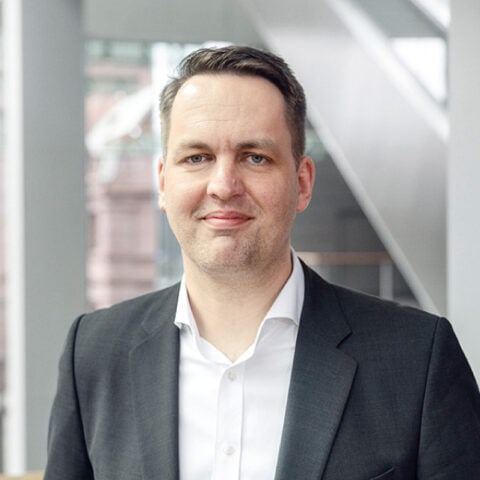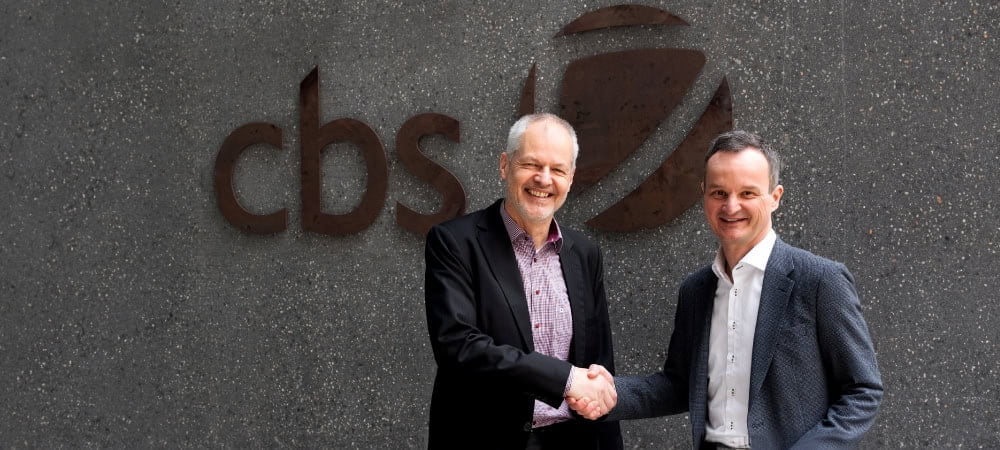The added value of AI and HR

In the SAP community, the composite ERP approach is gaining more and more supporters. In addition to SAP, existing SAP customer Mercedes in Stuttgart also uses Salesforce and Workday, and their HR system is gaining more and more supporters.
Digitalization is only successful when it can demonstrate concrete benefits. This is the starting point for the new book by Professor August-Wilhelm Scheer. He focuses on the flexible, agile and innovative composable enterprise as the model for successful digital corporate transformation.
With a composable enterprise, end-to-end processes and ERP functions such as HCM, CRM and SCM can be developed, supplemented and exchanged as independent process units. The concept combines a customer-oriented decentralized organizational concept with resource-saving central processes. In Stuttgart, SAP user Mercedes has supplemented its SAP ERP system with a CRM from Salesforce and an HCM from Workday.
Professor Scheer writes in his latest book that the appropriate information system is based on a platform architecture that provides services for process automation, integration, low-code development and the assembly of components. This architecture represents a paradigm shift from monolithic application systems. Intelligent interfaces between SAP and Workday and verified E2E processes are a prerequisite.

“Composable Enterprise is embedded in a lifecycle model that ranges from innovation development to process mining and continuous improvement.“
Professor Dr. August-Wilhelm Scheer
The concept of the composable enterprise is embedded in a lifecycle model that ranges from innovation development to enterprise architecture, process execution, process mining - at SAP, for example, Celonis or Signavio - and continuous improvement. Highlighting important innovation drivers such as Generative AI shows important starting points for digital transformation and thus the necessity for the paradigm shift of the Composable Enterprise.
Sector concepts and functional areas for industry and services show how organization and application architectures interlock in the composable enterprise. The aforementioned example of Mercedes with SAP, Salesforce and Workday is proof of this. Professor Scheer describes various approaches to realizing such a flexible and adaptable enterprise and provides advice and assessments based on his wealth of experience in his book "Composable Enterprise".
Artificial intelligence and business decisions are merging. The use of artificial intelligence (AI) has increased dramatically over the past year - not least thanks to ChatGPT and other services. AI-supported services are also playing an increasingly important role in the implementation of business decisions, as digitalization and automation mean that companies are increasingly confronted with complex volumes of data that need to be analysed in order to make informed decisions. AI provides particular support in the analysis and efficient processing of such large volumes of data.
Composable ERP and AI
IT technologies such as cloud computing, process mining and artificial intelligence will permanently change the ERP market. SAP's existing customer Mercedes is a pioneer here. This will lead to a displacement in the areas of CRM, HR, finance and logistics. Angelique De Vries-Schipperijn, President EMEA at Workday, says that the question is: "How do companies want to position themselves for the future?" Workday offers an enterprise management cloud that enables agility and scalability for companies, truly integrates artificial intelligence into applications and continuously delivers innovation for finance and HR. "We want to do an even better job of helping people realize their potential by using AI natively in our solutions," explains Workday manager De Vries in the E3 interview. "Our goal is to enable companies to make faster and better decisions - but always with the possibility for humans to intervene. We approach the topic of AI differently than other providers of business software."

“From DSAG's point of view, it remains to be seen what AI means for specific ERP applications, as AI was already being used long before the hype.“
Sebastian Westphal,
Chief Technology Officer,
DSAG
AI can recognize patterns and correlations that are often difficult for human decision-makers to grasp. The experts at Workday have been studying artificial intelligence for many years, yet the bottom line on AI use to date is: 2024 will be even better. In 2023, companies rushed to integrate AI, but few considered the unintended consequences. In 2024, companies will realize that trustworthy processes around AI are also needed to build trust with their stakeholders. The responsible use of AI requires trustworthy data, transparent processes and more importantly, humans must continue to be the final decision maker.
The correct use of AI was also a dominant topic at the last DSAG Technology Days 2024 in Hamburg: the quick and easy availability of ChatGPT has given the topic of artificial intelligence a lot of momentum since November 2022, analyzed DSAG Chief Technology Officer Sebastian Westphal. However, from DSAG's perspective, it often remains unclear what AI means in terms of specific applications. AI was already being used long before the hype surrounding generative AI and large language models (LLMs), for example to automate ERP or HCM processes or to better identify cyber threats using machine and deep learning models. If AI is now increasingly integrated into existing processes such as finance, CRM and HCM and data-driven approaches are further developed, this will help to increase the competitiveness, profitability and resilience of companies in the long term.
AI can bring benefits, but as soon as the human factor is removed from the equation, there is a risk of negative results. AI systems in 2024 must therefore be characterized by validity and reliability, transparency and interpretability, fairness, privacy enhancement, security and resilience. "Therefore, a human-in-the-loop approach is essential so that the end user retains control over the final decisions," defines Angelique De Vries.
Sebastian Westphal in Hamburg at the DSAG Technology Days added on the topic of AI: "For example, transparent and proven billing models and metrics are needed. It must also be possible to prove that valid guidelines have been implemented and documented when AI makes process decisions. And from a technological perspective, it would be important to know how to handle the sensitive company information that is used."
AI and cloud computing
"In terms of technical possibilities, we are pursuing a platform-based approach in which we integrate AI into our technology platform," says Angelique De Vries, explaining the Workday strategy. "And this in turn has its origins in our architecture: at Workday, we speak of a true cloud, i.e. a real cloud architecture based on the principles of the cloud and cloud-native technologies and processes."
This is another key feature of a true cloud architecture - the underlying technology is constantly evolving at Workday to scale with the customer base, size and scope of the solution. "To summarize, we are always striving to provide our customers with fast and comprehensive access to the latest cloud innovations so that they can always achieve the best possible performance, quickly realign their business model and respond flexibly to market changes at any time. More and more companies are recognizing and appreciating this and our customer base in Europe is growing exponentially," says Angelique De Vries, describing Workday's current success.
The HR and finance provider Workday achieves high added value for users through its stringent and uniform cloud architecture. There is no uncontrolled growth here. The SAP community is irritated by the SAP cloud strategy, which does not find the right path between hybrid, private and public. However, cloud-native providers such as Workday can generate considerable added value for users from a consistent strategy with a singular architecture. The path to the Workday cloud is also open to existing SAP customers. From the user's point of view, Workday is characterized by usability, consistency of the solution and mobility. The design and solutions are very intuitive and tailored to the user. Added to this is the speed. Due to the underlying architecture, Workday is very fast: the solutions are extremely performant, agile and scalable. Workday has been pursuing a clear strategy for 18 years and is sticking to it. Instead of strategy changes and product discontinuations, customers receive a reliable and future-oriented product strategy for HR and finance. This transparency and clarity is a decision criterion for many Workday customers and a guarantee of trust in a highly volatile economic environment.
A new power dynamic is emerging between employers and employees: 2024 is all about trust! From the Great Resignation to the Great Stay, much has been said about the shift in power between employees and employers. But does it really matter who has the power? In 2024, the discussion will shift to how companies can build and maintain trust in their teams. To create this trust, the engagement of their employees must be at the forefront. So tools will be needed to understand the internal mood among employees - and in turn give them the assurance that their voice is being heard. The future of work is a high-performing company and a highly engaged workforce.
"What is known today as people management is already at the heart of Workday's values," says Angelique De Vries-Schipperijn, describing the market situation. "Employees and their needs are at the heart of everything we do. And the HR department is increasingly focusing on this, which we see as a positive development. The employee is no longer seen as a resource."
Modern companies consider the entire life cycle of a person and not just individual phases. This significantly changes the role and function of the CHRO and the HR department. This was particularly evident this year at the annual meeting of the World Economic Forum 2024 in Davos, where the presence of HR managers was significantly higher than in previous years.
If you believe the surveys, many young employees are no longer fixated on pursuing a career in top management in the long term. Is that true? And what does this mean for HR management? "That's an interesting question. Let me tell you about my experience at Workday," answers EMEA President De Vries in the E3 interview. "We employ very intelligent specialists who want to make a career for themselves, develop their skills and continue their education. In recent years, I have not noticed any negative changes here, but rather a stronger focus on work-life balance, the importance of an employee-oriented corporate culture and the company's commitment to sustainability."
Adaptability and agility
Angelique De Vries-Schipperijn sees two major changes: "Career paths are no longer linear, which in my opinion is not a sign of a lack of ambition, but rather an adaptation to the life circumstances of employees." Parental or care leave, the desire for a sabbatical, possible changes to the job description and the associated desire to change jobs: career plans can be much more flexible today and companies should take this into account. "The more flexible we are, the more agile the organization needs to be. Adaptability and agility are two important buzzwords today. Our cloud architecture supports adaptability and continuous innovation."
All Workday customers work with the same version and regularly receive new functions. In addition, external data is merged with Workday's HR and financial data to create a single source of truth. This is important for companies to stay innovative, grow faster and better engage their employees. HR management is constantly evolving and adapting to technological change, new business models and employee expectations.
"And that brings me to the second change I'm observing," says De Vries. "In recent years, there has been a shift in the mindset of organizations to continuously listen to their employees to better understand what motivates them, where there are challenges that need to be addressed, etc. A continuous listening platform like Workday Peakon Employee Voice can play an important part in building a positive employee experience - by using AI, large volumes of anonymous employee feedback can be analyzed and trends can be derived from the data at an early stage. This gives management a real-time picture of employee sentiment."
HR automation
A study by analysts from IDC shows: Automation leads to greater efficiency in HR! More and more HR managers are realizing that automated processes enable their teams to work more effectively and focus on value-adding tasks. The results published in the IDC Info Brief show the attitude of HR managers towards automated processes - and how this digital transformation can support companies on their way to a results-oriented HR future.
Human resources is undergoing a period of change and is no longer limited to core tasks such as recruiting, hiring, managing and assessing employees. Instead, HR departments need to improve the employee experience as a whole. They need to promote diversity, inclusion and equality and manage training and retraining opportunities. In addition, the HR department is responsible for advising and managing employees. It ensures smooth internal communication. "Our HR department is now almost paperless. Pay slips, vacation requests, HR reports, etc. are now only processed digitally. This speeds up our processes immensely and makes handling very simple and efficient for everyone involved," explains Rainer Hallenberger, Group VP HR and Corporate Development, CHT Group.
The biggest problem for HR departments is that they do not have enough staff to cope with the new challenges. Even for traditional HR tasks, there are often not enough specialists available. In this situation, more and more HR managers are realizing that automated processes can help their teams to work more efficiently and focus on value-adding tasks. The world of work and employees are much more heterogeneous and diverse today than they were ten or twenty years ago. "It is important to understand that today, from the company's perspective, every employee must be considered individually and a one-size-fits-all approach simply no longer works," Angelique De Vries-Schipperijn knows from her professional experience.
For example, employees have different career goals, learning needs and skills. At a time when talent is scarce, it is all the more important to tailor experiences to individuals in order to promote employee engagement, maximize their career potential, increase their productivity, etc. Many companies have already recognized this: To retain talent in the long term, they need to offer the right career opportunities. They will only succeed in this if HR software is further developed to better reflect the changing needs of the world of work and employees and to support personalized career planning.
"Let's take a look at one of today's challenges," says Workday manager De Vries. "I want to ensure that my employees are optimally deployed according to their skills. But how do I identify the skills that are relevant for my company in the various divisions? And also those that are already available in the workforce? We can simplify the management of the tens of thousands of skills that exist in every company by using AI. In addition, we can intelligently suggest to employees the skills we believe they have based on their profile and use this skills data to match employees to job requirements - contributing to much more agile organizations. We already offer this with the Workday Skills Cloud, for example."
Reliability and availability
Workday customers rely on Workday to provide them with the highest level of reliability and availability. To ensure this, the company invests heavily in supporting product deployments with security features, controls and testing already built into the approach to provide the necessary functionality, visibility and transparency. "Another important aspect of our work is enabling collaboration and productivity from anywhere and with a wide range of collaboration tools," explains De Vries. With Workday for Microsoft Teams, for example, employees can quickly access Workday data and tasks without having to leave their work environment. Another example is mobile working with the Workday app. What many people take for granted in their private lives today is a challenge for many companies, especially small and medium-sized enterprises. "Here, too, we support our customers such as the CHT Group: Workday enables all 2,400 employees on all five continents to access HR-relevant processes and data on the move around the clock," says De Vries, describing the Workday service.

Core areas and options
According to the IDC Info Letter, companies that want to automate their HR management and focus on results should concentrate on core areas. Personnel administration, payroll accounting, workforce scheduling and the management of temporary staff are core tasks that need to be performed reliably despite their repetitive nature. Automation can lead to significant improvements in each of these areas.
Recruiting new employees today means much more than identifying and hiring the best candidates. In the competition for employees, it is much more about retaining them in the company in the long term. Results-oriented HR management requires marketing the company to the outside world. The recruitment process must be lean yet meaningful, and onboarding must be productive and fast.
The transformation of the workforce includes the training and development of employees with regard to new business requirements. The process should be based on the skills and experience of employees, available vacancies, temporary assignments and projects, and the career aspirations of individual employees. Many companies prefer to upskill and retrain existing employees rather than hire new employees with the desired skills. Measurable data and detailed insights are essential for HR departments to improve their effectiveness while increasing their strategic relevance. The dreaded annual performance appraisal should be replaced by continuous, data-driven coaching. Hierarchical silo structures need to be broken down and supplemented by cross-functional teams. The focus should be on business results and be geared towards customer satisfaction. Opaque individual agreements must also be replaced by transparent and fair regulations when it comes to remuneration.
Community and platforms
"The needs of our customers have always driven us as a company. Not only does our organization focus on how we can provide new ideas and technologies to our customers, but we also actively solicit feedback from our customer community when it comes to how they would like to see the Workday platform evolve," Angelique De Vries-Schipperijn defines relationship management. "In this way, we have created a collaborative ecosystem over the years that is crucial to our success. It's a combination: our customers expect us to break new ground and develop new ideas for their future success, but we listen and respond to our customers' ideas. And another important point is that we encourage our customers to take advantage of the tangible benefits we offer them, but we don't force them to do so."
Artificial intelligence is an essential tool for capturing relevant metrics in real time. This makes it clear that there needs to be closer cooperation between HR, IT and other departments. This is the only way to integrate technologies seamlessly and interpret data effectively. Particular attention should be paid to training the HR team in the areas of data analysis, machine learning (ML) and HR technology. "The IDC study shows that HR is in a pivotal phase, as it is much more business relevant than it used to be and is evolving from a cost center into a value-adding position," says Richard Doherty, Senior Director Product Marketing, Workday.
Data volumes and finance
"The finance department is affected by a similar change," says Angelique De Vries-Schipperijn in the E3 discussion, leading on to the next Workday topic. CFOs are now more concerned than ever with what they can do to improve the employee experience. Like other departments, they are faced with the question of how to attract and retain talented employees with the right skills. The use of innovative technologies, e.g. to simplify workflows through automation, create agile finance processes or provide a modern user experience, can make an important contribution.
"A major challenge of our time is the constantly growing volume of data - both in HR and finance," explains De Vries. How are companies dealing with this today and in the future? "On the one hand, we are seeing changes that affect the role of the CFO themselves, and on the other hand, external factors play a role, such as the reporting of information that does not relate to financial data - keyword: ESG. A company must ensure that the data is correct, which requires data harmonization," says De Vries.
CEOs expect CFOs and their teams to quickly deliver analysis and insights that support their strategy and decision making. The requirements have changed and they need to know how to use data beyond just the numbers to tell a consistent story that explains the context and rationale for a decision and answers "what if" questions.
Companies that already work with Workday in the HR environment and are planning to reorganize their CFO area are now increasingly considering Workday's finance solution. Angelique De Vries comments: "In the DACH region, we are seeing increasing demand for our finance solution from existing customers, both in the midmarket and in the large customer segment, who are already using our HCM solution." Inna Landman, SVP of Talent Acquisition, People Insights and People Experience at Workday, adds: "Better decision making and operational efficiency in finance is important. In 2024, there will be more innovation through AI in finance, as finance tends to be perceived as risk averse - but this is where the most potential lies when it comes to innovation and change. The Workday Global CFO AI Indicator Report has shown that finance leaders in particular have long recognized the importance of a sound AI strategy as a key competitive advantage. Better decision making and operational efficiency were cited as the top reasons for adopting AI tools. As a result, we will see the number of financial institutions transferring even more of their data to a cloud-based AI platform grow in 2024."
AI has the potential to fill the skills shortage in the financial sector in 2024. In fact, three quarters of financial service providers already predict that the sector will be hindered in its development - and only by the lack of skilled workers. AI can help here in a variety of ways. For example, it can predict the demand for workers by using company data for long-term and short-term trends.

AI benefits and mindset
The financial sector can only continue to develop if it succeeds in attracting, retaining and training tech-savvy talent. The use of AI is crucial for this. Because if AI is successfully implemented, banks could reverse the talent trend. The opportunity to innovate in such a fundamental industry has a certain appeal to data scientists and engineers - finance just needs to make itself attractive enough. Angelique De Vries-Schipperijn concludes: "As tempting as it sounds to have automatable work carried out by machines: Many companies still shy away from this type of innovation. For fear of the unforeseeable consequences - but one foreseeable consequence is that this reluctance makes them unattractive to new talent. Only those who establish a progressive mindset in the workplace and support it with appropriate technical tools will be well positioned in times of skills shortages."




